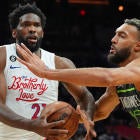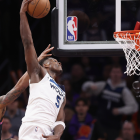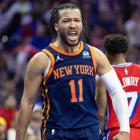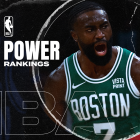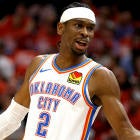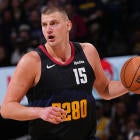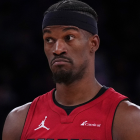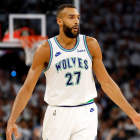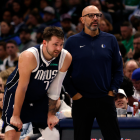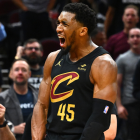
Awards races are almost never decided by the quarter mark of the season. Remember, by this point last season, Defensive Player of the Year Jaren Jackson Jr. had played in only 10 games. Jayson Tatum was the leader of Tim Bontemps' first MVP straw poll, while eventual winner Joel Embiid ranked 10th. Even wire-to-wire winners typically face some midseason competition. Paolo Banchero never ceded his status as Rookie of the Year favorite, but Jalen Williams made him sweat in the second half of the season.
Where we land today almost certainly won't be where we end up in the spring. This exercise is more of a barometer of where we sit after 20 or so games. If the season ended today, these would be our worthy award winners. That doesn't make these picks predictive or even objective. They are a snapshot of what we've seen so far and nothing more. And so, without further ado, here are my awards picks (and full ballots) after roughly one quarter of the season.
Most Valuable Player
1. Joel Embiid
2. Nikola Jokic
5. Kevin Durant
The great MVP wars of 2023 were fought on dozens of fronts. Style was a critical one. Nikola Jokic plays the beautiful game. Joel Embiid grinds you to dust. Jokic was held up as a paragon of the sort of basketball Embiid couldn't play when he won the championship. Embiid spent the offseason nudging the 76ers in Denver's direction. "I never liked just being an iso player," Embiid told The Inquirer's Keith Pompey in October. "I don't think that's the right way to play, and I don't think that's the right way to win."
Embiid will never be Jokic, but he's found the middle ground that's working for him. He's scoring more than he did last season (albeit slightly less efficiently), but he's doing it with roughly a 25% dip in isolation shot attempts per game and a 50% increase in assists all the way up to a career-high 6.4 per game. The impact those changes have had on his teammates is incalculable. Tyrese Maxey is headed for his first All-Star appearance. Tobias Harris is no longer just the NBA's most overpaid spot-up threat. Philadelphia's net rating is nearly three full points per 100 possessions higher than it was with James Harden a year ago.
Don't underestimate the Harden elephant in the room, though. Embiid has now deftly guided his franchise through two separate teammate trade demands, but he's also adapted his game to fit whoever has been around him several times now. Embiid doesn't have the greatest pocket-passer in NBA history feeding him easy buckets anymore. His pick-and-roll game with Maxey is far more varied—Maxey's speed opens doors that Harden never could. Meanwhile, only Brook Lopez is contesting more shots per night defensively than Embiid.
Jokic, predictably, has remained the numbers darling of the race. He leads all players in VORP, Win Shares, Box Plus-Minus and Real Plus-Minus. After a promising start, the Denver bench has reverted back to the comatose state in which it has spent most of the past three seasons. Either Jokic dominates his minutes or the Nuggets lose. But his efficiency was dipping even before his bizarre 18-of-58 two-game shooting stretch against the Clippers and Rockets. (While two games are a blip in the grand scheme of the race, they represent roughly 9% of the sample we're tracking here. That's not nothing.) The numbers are less concerning than the eye test there. Jokic never forces the issue like he did in that Clippers game. That's something to monitor.
The fourth straight battle between Embiid and Jokic is almost too close to call at the moment. Jokic may well be ahead a week from now. But the two of them aren't alone at the top.
Neither Embiid or Jokic leads the NBA in total points generated. Tyrese Haliburton does. He is scoring 26.9 points per game on his own, but generating another 31.7 off of his assists. That's a total of 58.6 points per game of offense coming directly out of Haliburton, more than Jokic generated in either of his MVP seasons. Indiana's overall offensive numbers are frankly preposterous. The Pacers are scoring 3.1 points per 100 possessions more than any offense in NBA history. They're the all-time leader in team points per game despite playing in a relatively slow era. The next nine teams on that leaderboard played in 1984 or earlier. No 21st century team is within even five points per game of the Pacers, and Indiana's second-leading scorer is Myles Turner at 17.1 points per game. No team's identity relies more heavily on a single player than Indiana's. All of this is possible because of Haliburton.
And yet, you could credibly argue that he's not a top-three candidate. No metric has proven more predictive for MVP purposes than EPM, and it's the one major metric that Jokic does not currently lead. Shai Gilgeous-Alexander does, and it's not close. Granted, Gilgeous-Alexander certainly isn't the second-most impactful defender in the league as it suggests, but his two-way excellence this season has largely gone unnoticed. He leads the entire NBA in deflections per game and ranks third in loose-balls recovered. No guard, unless you count OG Anunoby playing out of position, contests more shots per game. Oh, and he's casually having his best shooting season while averaging a career-best 6.2 assists. Picking between him and Haliburton is brutal. Haliburton edges him out by the slimmest of margins due largely to circumstance. Gilgeous-Alexander may be the better overall player, but in a world of "value," it's worth mentioning that Gilgeous-Alexander has two borderline All-Star teammates.
The top four, for the time being, has a bit of separation from the pack. The No. 5 slot comes down to four players: Kevin Durant, Giannis Antetokounmpo, Luka Doncic and LeBron James. Any of them are viable. We'll cross off two simply based on their support systems. Dallas has been just fine during the minutes Kyrie Irving has played without his co-star. Antetokounmpo's Bucks are 15-7 largely on the strength of their clutch performance, which is Damian Lillard's domain. The Bucks badly need the Defensive Player of the Year version of Antetokounmpo. He hasn't been that player this season.
James was the toughest omission. He is everything to the Lakers offensively. With him on the court, they've blasted opponents by 131 points. Without him? They've been outscored by 104. But Durant has carried a similar load, and he's largely done it without Devin Booker and Bradley Beal. He's making half of his 3-point attempts. He's been surprisingly vital to a Suns defense that has hovered around league-average with one of the worst center rotations in the NBA. He's vacillated flawlessly between primary playmaker duties with Booker out to a more secondary role when Booker plays. We're splitting hairs at this level. Anyone in the top eight has a reasonable chance of winning. This is one of the strongest overall MVP races in years.
Defensive Player of the Year
1. Rudy Gobert
3. Herb Jones
It's a two-man race for Defensive Player of the Year so far. Basically every defensive metric has Gobert and Davis neck-and-neck. Davis has a slight lead in some of the more tangible areas—blocks, deflections, contested shots, things of that nature. Opponents are faring worse against Gobert at the rim, hitting 40.4% of their looks against him compared to 43.8% against Davis. Opposing offenses are more comfortable going at Davis than they are Gobert as well. Minnesota allows the fourth-fewest shots in the restricted area. The Lakers are 17th.
Lakers fans would point to the injuries they've had on the wings. Minnesota has probably had a more consistent point-of-attack defense in front of Gobert than the Lakers have had in front of Davis, but injuries have limited Jaden McDaniels to just 260 minutes this season. He's more important than any non-Davis/Gobert defender on either team by a wide margin. That hasn't slowed the Timberwolves down one bit. Minnesota lineups featuring Gobert and no McDaniels rank in the 98th percentile league-wide in terms of points allowed per 100 possessions, according to Cleaning the Glass. The Lakers actually have a better defensive rating with Davis off the floor at 108.4 than they do with him on it at 109.7.
Davis creates schematic opportunities that Gobert just doesn't, especially now that the Lakers have their perimeter defenders back. They can switch almost any action if they so choose. Don't sleep on Gobert's versatility. He's not Davis, but he's playing higher on screens than he usually does to take advantage of his more aggressive defensive teammates, and the Timberwolves have even had some success blitzing him. Minnesota's defense has been more consistent this season. Only five opponents have reached 115 points against them. Twice as many have against the Lakers. Embiid, Jokic and even Domantas Sabonis have bullied Davis at points this season. No opposing big man has scored 30 against the Timberwolves this season. Add all of this up and Gobert has a small but noticeable lead here. Davis has momentum, especially with the way his supporting cast is playing, but this is Gobert's trophy to lose at the moment.
None of the other traditional big men have seized control of the No. 3 slot. Philadelphia and Miami haven't defended quite as well lately as they were to open the season. Chet Holmgren has a case based on certain numbers, but he's just so exploitable in the wrong matchups because of how skinny he is. Evan Mobley has been great with Jarrett Allen and merely very good without him. So let's go in another direction.
Herb Jones checks every box. He's elite at just about every component of defense—man-to-man, switchability, help, play-recognition, general disruptiveness. How many players can defend both John Collins and De'Aaron Fox at a high level? Put him in a situation in which his role is a shade more consistent and the talent around him is more defensively oriented and Jones might make a real run at this award. For now, he's up there with anyone besides Davis and Gobert.
Rookie of the Year
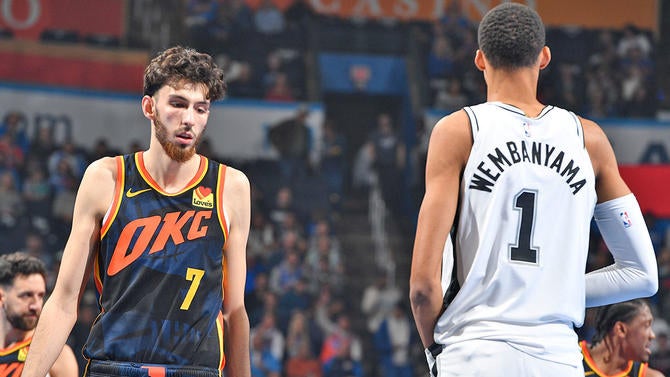
1. Chet Holmgren
This is the easiest ballot we'll deal with today. Holmgren isn't just the best rookie this season, he's the best rookie since at least Luka Doncic. He's already a top-20 player in the NBA by VORP and Win Shares, and EPM rates him the eighth-best player in basketball so far this season. Prefer counting stats? Okay, he's on track to become the fifth player in NBA history to average two blocks and 1.5 3-pointers per game in a season. Not the fifth rookie, the fifth player. He's a better individual shot-creator than the Thunder could have hoped for this early. The real question at this point is whether or not he's going to be an All-Star.
Victor Wembanyama will be one some day. For now, he's just not efficient enough. That's not exactly his fault. The Spurs have spent time pretending Jeremy Sochan is a point guard, and the entire offense has suffered because of it. Holmgren is on a team designed to maximize his specific gifts. Wembanyama isn't even really on a team yet. He just wears the same uniform as a group of players that will mostly be replaced in the next year or two. The highs have been as advertised, and the skill-set is as promised. But Oklahoma City's goal is to win, and Holmgren is making winning plays. San Antonio's goal is to develop Wembanyama, so he's making mistakes that might one day make him a better player, but for now hamper his resume in comparison to Holmgren.
Jaquez is the clear No. 3, and is stealthily building a reasonable Sixth Man of the Year case as well. The role player skills were a given. Nobody expected Jaquez to be a top-five rookie scorer so far this season. Miami's player-development system is renowned, but its success stories usually take a year with some time spent in the G-League to blossom like this. Nope. Jaquez is playoff-ready and it's not even Christmas yet. Charlotte's Brandon Miller and Dallas' Dereck Lively II have both exceeded expectations, but Jaquez is the clear choice here.
Most Improved Player
2. Tyrese Maxey
There are five reasonable candidates here, and your choice is going to come down to your definition of the award. Cam Thomas is the biggest rags-to-riches story of the five. No other player on the board has increased their scoring by nearly 14 points per game. But Thomas has played only 12 games and he's trending down offensively, so for the time being, he's off of the list. Haliburton, as we've covered, is an MVP candidate. The leap from All-Star to MVP candidate is probably the most important leap any single player can make. But the award is for the "most" improved player, not the player who improved in the most important way. Haliburton was already spectacular. Giving him a trophy for jumping from an A- to an A+ doesn't feel like it fits the spirit of the award.
That leaves us with the three middle-ground candidates that typically fit the "first-time All-Star" profile voters look for. Measuring improvement in any of them is tricky because so much of their statistical growth is tied to their greater opportunities. Maxey's scoring volume has gone up, but he's been less efficient. There's nothing wrong with that. His job is harder now than it was when he shared a backcourt with Harden. But it obscures his improvement, which has mostly come in the form of his playmaking. Except Embiid has been better there as well, and Nick Nurse deserves a fair bit of credit there. Barnes has been a little bit better at basically everything. He's averaging career-highs in points, rebounds, assists, blocks, steals and 3-point percentage. The shooting is powering all of this. Defenders are respecting his jumper, and it's opening up everything else he wants to do offensively.
But I'm just going to share the following statistical comparison to express why I give Sengun the slightest of leads at this point:
Year-3 Alperen Sengun | Year-3 Nikola Jokic | |
Points | 20.8 | 18.5 |
Assists | 5.7 | 6.1 |
Rebounds | 9.1 | 10.7 |
Effective Field Goal Percentage | 56.7% | 55.4% |
They're not identical players. Frankly, comparing anyone to Jokic is sacrilege. Sengun doesn't quite have Jokic's range, and nobody has ever had Jokic's remarkable instincts. But the gravity of what is happening in Houston right now isn't drawing nearly the recognition that it should. A few years ago, a player from a hitherto non-existent archetype became the best player in the world. Now there's another young player following a suspiciously similar developmental trajectory. Houston hasn't ceded quite as much control over its offense to Sengun as Denver had to Jokic by that point, but we're drifting in that direction. The Rockets are embracing him as their centerpiece. Maxey is still Embiid's Robin. No Raptor is playing like a Batman offensively this season. But the Rockets belong to Sengun, and they are going to for years to come. Such an emergence warrants favorite status for this award.
Sixth Man of the Year
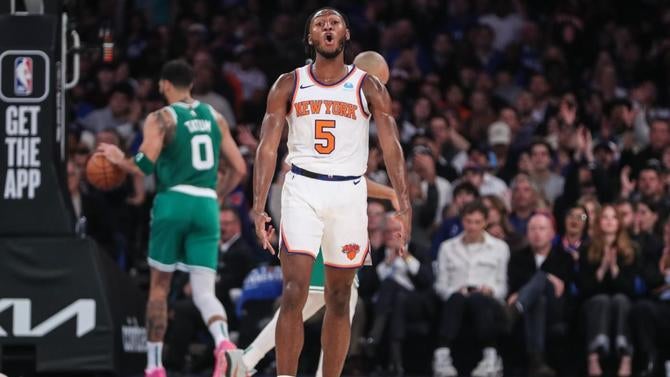
3. Malik Monk
If Quickley was defending as well as he did a year ago, he'd be the runaway favorite. But he's taken a step back on that end of the floor this season, and some of his offensive responsibility has shifted to newcomer Donte DiVincenzo, so the field is wide open here. Most of the candidates are your typical bench gunner types, but Quickley and Reaves stand out as the most well-rounded of the group.
Reaves has been more efficient. He's more of a playmaker as well. There's just one stain on an otherwise stellar resume. A sixth man is supposed to be able to carry bench units when stars sit. As we covered, the Lakers fall off of a cliff whenever LeBron James rests. Laker lineups featuring Reaves and not James are getting outscored by 11.4 points per 100 possessions, according to Cleaning the Glass. Reaves is playing well off of the bench, but it's not a role he's ideally suited for long-term. Reaves amplifies great players, he doesn't lift up bad ones. But Quickley? Basically every lineup he's a part of thrives. No Knick has a better point-differential this season than his plus-82 figure. Meanwhile, the Knicks are minus-13 when he sits, the worst mark on the roster. He's doing the job that sixth men are supposed to do: keeping the team going when its best players rest.
Picking a third-place finisher is a frustrating endeavor largely because of how many candidates just aren't playing enough. Jonathan Isaac is the per-minute Defensive Player of the Year. I just can't justify picking someone who plays 13 minutes per game. Even Isaiah Joe's 20.6 minutes aren't enough to sneak into the mix here, and Oklahoma City has a bananas plus-17.5 net rating with him in the game. Alex Caruso would be in the thick of this if he wasn't starting for the Bulls. If he gets traded to contender and returns to the bench, his candidacy should be revisted. If Trey Murphy III remains on the bench, he's going to make a run by virtue of being the league's most talented reserve.
Monk ultimately stands out among the remaining bench scorers, with Tim Hardaway Jr., Bogdan Bogdanovic and Cole Anthony all firmly in the running. None of them can defend. Monk's combination of efficiency, playmaking and clutch bonafides put him ahead of this pack. Truthfully, though, virtually any bench player in the league is still in the running here. Nobody has grabbed control of this race yet.
Coach of the Year
1. Nick Nurse
2. Jamahl Mosley
3. Ime Udoka
Coach of the Year is a nearly impossible award to pick because so much of coaching is invisible. How much credit does any given coach deserve for a team's success vs. the players who actually made it happen on the court? Mosley, the current betting favorite, is a perfect example of this phenomenon. The Magic have drastically outperformed expectations this season. Have they done so because the coaching staff has drawn more out of their roster than others would have? Or were our expectations merely lower than they should have been? The Magic were a .500 team from roughly December on last season. Yet their projected preseason win total was 36.5. We should have expected a young roster to improve, though it came quicker than any of us imagined. Coaching is likely a big reason for that. It's usually pretty difficult to isolate a coach's impact against our own misjudgment of the players they're working with.
Nurse stepped into a situation in which coaching can be more readily measured. We had three years of tape on the 76ers under Doc Rivers. We knew where the missteps were and what changes were needed. Nurse implemented them while dealing with the uncertainty of whether or not Harden would ever play for him. It's extremely rare for a single team to produce the MVP and the Coach of the Year, but in a case like Philadelphia's, it's warranted. It took a creative coach to design an offense that could both maximize Embiid's scoring and keep the rest of the roster engaged. It also took a significant buy-in on Embiid's part. Both matter.
As we've covered, Mosley and Udoka have both exceeded expectations. So has Chris Finch, even if Minnesota had loftier ambitions coming into the season. Any of them are reasonable picks, but there's no objectivity in picking a winner here. Your choice is going to rely on your evaluation of the players as much as the coach.













